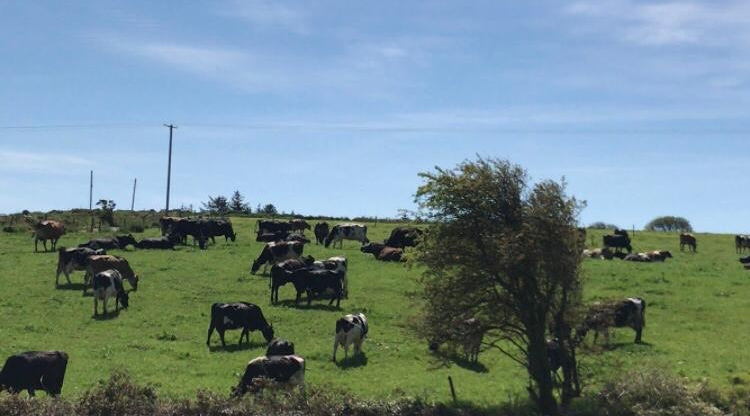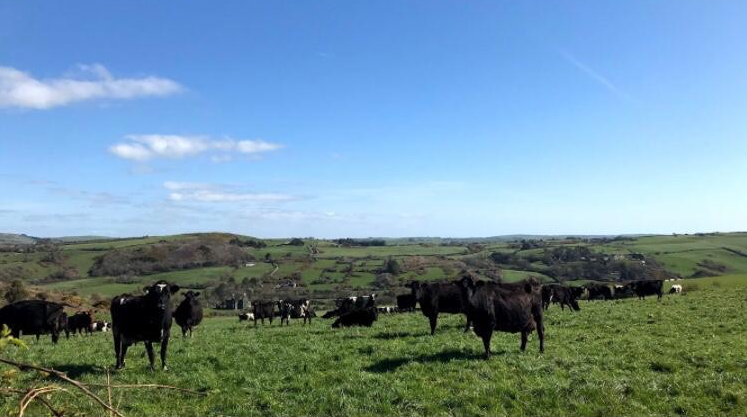For this week’s Dairy Focus, Agriland made the trip down to the rebel county to the farm of Denis and Collette O’Donovan, along the Wild Atlantic Way.
Located halfway between Rosscarbery and Glandore in Co. Cork, Rouryhill farm overlooks Glandore harbour and the Atlantic ocean. Denis farms alongside his wife Collette, son Eoghan and his parents, DJ and Shelia.
Speaking to Agriland, Denis said: ”We are farming just outside Rosscarbery, west Cork, and are currently milking 160 crossbred spring-calving dairy cows on a grass-based system.
”My wife Collette and my father DJ, are heavily involved in the farm along with my son Eoghan.
”Collette would look after the calves, while Eoghan helps with the calves and will also milk for me.
”Eoghan recently turned 18, and is currently extremely interested in the farm, he will hopefully choose to take over the farm.”

Background
Speaking about some of the history of the farm Denis said: ” I took over the farm from my father in 1996; like most farms at the time in west Cork it was a mixed farm.
”My father would have been milking 50 cows and kept some beef cattle as well, but when I took over I wanted to focus on the dairy.
”Quotas were an issue; I couldn’t just add on another 50 cows, we had to buy or lease quota and increased the herd size that way.
”Over the years we would have bought quota or rented land that had quota attached to it and gradually we expanded the herd size.
”My father would have started milking here in a six-unit parlour built in the early 1970s, that was then converted into an eight-unit in late 1980s.
”As the herd size began to increase over the years, the parlour wasn’t doing the job, so in 2008 we built a 20-unit Dairymaster parlour.
”We specified the parlour to include automatic cluster removers (ACRs), automatic feeders and Swiftflo bailing.
”The current milking platform is 44ha, so we are quite highly stocked on the platform, we also have a 20ha rented outblock.”
System of production
Speaking about the current production and the reason for choosing a crossbred cow, Denis stated: ”I went to New Zealand in 2007 and saw how they were producing milk from a grass-based system using a crossbred cow, and decided that I would begin crossbreeding the herd at home.
”We now operate a spring-calving, grass-based system with the aim to have cows out grazing from early February onwards.
”This year spring grazing has been challenging, but we still have nearly 90% of the farm grazed and should be starting our second rotation in the coming week.
”We have been seeing some exceptional growth rates so far this year; we had a growth rate of 45kg/DM/ha in March which we never would have had before.”
Breeding
Commenting on plans for the future and breeding policy going forward, Denis said: ”We are now at a point where we cannot expand any further so we are going to improve the production through breeding.
”We plan on breeding better cows that will produce higher levels of milk solids and maintain our current levels of fertility.
”We are currently achieving a 90%, six-week calving rate, with a 20% replacement rate.
”The aim moving forward is to continue improving solids production from the herd; we are currently producing 430kg of milk solids per cow at 4.8% fat and 3.8% protein.
”We are suppling Lisavaird co-op and are paid on the A + B – C system, so having good solids is important.
”Producing kgs of milk solids from grass is where the crossbred cow is doing a great job; we are only feeding about 600kg of meal so we are not pushing the cows too hard.
”We want to continue to improve our grassland management and become more efficient at growing grass and producing high levels of milk solids from grass.”
Winter accommodation
As the herd size increased, Denis needed more winter accommodation for the cows and decided to build topless cubicles instead of the traditional cubicle shed. Denis said: ”In 2017 we constructed 200 topless cubicles. I find them great as cows don’t get a shock when they go out to grass.
”We don’t have cows getting chills or a decrease in production; the cows are used to the weather and it’s really no different for them.
”We have an earth bank behind cubicles that protects the cows from the prevailing wind, so they are out of the worst of the weather.
”At the side of the cubicles we have a woodchip area that we calve most of the cows on; again I find it great.
”Straw is hard to get in west Cork. There’s not as many tillage farmers around as there once was, so the woodchip is a great alternative.”
Sustainability
In 2018 Denis got the opportunity, through the Carbery group, to do a diploma in Environment Science and Social Policy in University College Cork (UCC).
”I found this very beneficial as we learned how what we do every day effects the environment we live in,” he explained.
”I believe in grass-based dairy production; we have the most sustainable milk production in the world. Carbery’s farmers have a carbon footprint of 1.04kg per litre of milk which is one of the lowest in the world.
”Our water usage is the lowest in the world of just seven litres to produce a litre of milk. Going forward with the new CAP [Common Agricultural Policy], we as farmers will address the issue of biodiversity by growing more hedges and trees.
”I have also joined another discussion group [already in two] about clover, and how the use of clover in grass swards can lead to the lowering of emissions, through the reduced used of chemical fertiliser.”
West Cork farm tours
Denis and Collette are founding members of west Cork farm tours. Speaking about this Denis said: ”It was set up four years ago by a number of farmers after the west Cork farming awards in the Celtic Ross Hotel.
”We all got together and saw an opportunity to promote agriculture in west Cork. We are all very proud of the products that we produce in west Cork and these tours allow consumers to see how these products are produced.
”We bring groups of people onto our farm and show them how we farm, producing milk from a grass-based system.
”If we can do our bit to promote some of the high quality products being made in west Cork, that can only be a good thing.”
The other families involved in west Cork farm tours are:
- Allshire family: Willie, Avril, William and Maurice – free-range outdoor pigs, forestry, an on-farm meat processing unit and timber processing unit;
- Crowley family: Michael, Marguerite and their five children run a dairy farm near Skibbereen;
- O’Sullivan family: John Joe and his family run a dairy and calf-rearing enterprise near the village of Rosscarbery.

”Our farm has some great views over Glandore harbour, Galley Head lighthouse and the Atlantic,” Denis added.
”It had been going really well until Covid-19 hit. We will hopefully get back up and running in the near future. I enjoy showing the farm and how we produce milk to people.”






